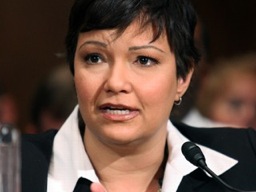
The move could allow the US Environmental Protection Agency (EPA) to order cuts in emissions without the approval of Congress. EPA administrator Lisa Jackson said the agency was now “authorised and obligated to make reasonable efforts” to cut greenhouse gases.
The news came as global climate talks got under way in Copenhagen aimed at forging a deal on major emissions cuts. Ms Jackson said that the scientific evidence surrounding climate change clearly showed that greenhouse gases “threaten the public health and welfare of the American people”.
She said the EPA’s so-called endangerment finding would “cement 2009’s place in history as the year when the United States government began addressing the challenge of greenhouse-gas pollution”.
Reports suggest the announcement, which had been in the pipeline for months, was timed to add weight to US President Barack Obama’s position at the climate change talks in Copenhagen, allowing him to argue that the US is taking action to combat global warming.
The US House of Representatives passed a bill in June that would cap greenhouse gas emissions and establish a national carbon trading scheme. But progress of a similar bill through the Senate is not likely before March at the earliest.
In April this year, the EPA decided that carbon dioxide and five other greenhouse gases could endanger human health and well-being. The decision was then sent out to public consultation, with people given 60 days – until 23 June – to respond.
An EPA spokeswoman told the BBC that the agency had received more than 300,000 comments and had been working on its response since. Under a Supreme Court ruling, the EPA’s “endangerment finding” was needed to allow the agency to regulate carbon dioxide and five other greenhouse gases released by vehicles, power plants and factories under the federal Clean Air Act.